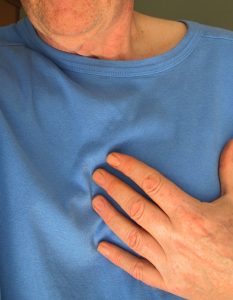Cardiac Arrest: Signs, Causes and Prevention
Cardiac arrest is when a person’s heart stops functioning. For cardiac arrest to happen, it’s not necessarily the case that the person in question has been diagnosed with or has heart disease. A range of factors can lead to cardiac arrest. Cardiac arrest can happen suddenly (“out of nowhere”), based on an event (such as an overdose, poisoning, or from an allergic reaction), or happen gradually, over time, with other symptoms. Cardiac arrest is typically fatal, especially if medical attention isn’t sought immediately.
In the United States, approximately half a million cardiac arrests occur outside of hospital settings per annum. This makes it an extremely common event, and one of the leading causes of death. Below, we will describe the signs and symptoms of cardiac arrest, as well as what you can do to prevent experience cardiac arrest yourself.
Heart attacks vs. cardiac arrest
Heart attacks aren’t the same as cardiac arrest, even though many people use the term interchangeably. Heart attacks cause cardiac arrest, but they don’t mean the same thing. There are also different kinds of heart attacks.
When a heart attack occurs, it happens because there was a blockage that stops blood flow to the heart. Heart attacks refer to the death of the heart muscle tissue because of the lack of blood flowing to it. Heart attacks, in simple terms, are a circulation problem. Heart attacks are often fatal.
Cardiac arrest is when the heart’s electrical system stops working. This is different than a circulation problem. The heart isn’t beating properly when a person goes into cardiac arrest. The pumping is stopped, or “arrested.”
Unlike during a heart attack, cardiac arrest can be fatal within minutes if proper steps aren’t taken immediately. Cardiac arrest is reversible with swift action, such as CPR. A defibrillator is also used to shock the heart back into its normal rhythm. Sudden cardiac arrest is considered a medical emergency, and emergency personnel should be called immediately if you suspect you or a loved one are experiencing cardiac arrest.
 The symptoms of cardiac arrest
The symptoms of cardiac arrest
The symptoms of cardiac arrest are dramatic and can be extremely frightening. They include: sudden collapse, a lack of a pulse, a lack of breathing, and a loss of consciousness. It is quite literally as though the person suffering has “dropped dead.”
There are other symptoms that lead up to the moment of cardiac arrest and may preclude the event. This will happen over a relatively short period of time, so keep your eyes open if you or a loved one are experiencing any of the following: extreme fatigue, fainting, blackouts, dizziness or vertigo, chest pain, shortness of breath, weakness, palpitations or vomiting.
This being said, cardiac arrest commonly occurs with no warning signs, unlike a heart attack so you may not be “prepared” with red flags.
Seeing a doctor
If you’re frequently experiencing chest pain, chest discomfort, heart palpitations or arrhythmia, rapid heartbeat, wheezing, shortness of breath, fainting, feeling as though you may faint, lightheadedness, vertigo or other dizziness, see a doctor as soon as you can. If these symptoms are persisting and over a short period of time, call 911 or other emergency services. Cardiac arrest always constitutes an emergency and if it is not treated immediately can and will be fatal. If help arrives on time, the person experiencing cardiac arrest has a chance at survival.
Brain damage can occur in just a few minutes. Brain death can occur which is effectively death. Severe brain damage can happen in as quickly as 4 to 6 minutes. Your most important resource during a cardiac event like cardiac arrest is time. This is also true of any event where a person is unconscious and not breathing. You must take immediate action.
Causes of cardiac arrest
Cardiac arrest is caused by an abnormality in the rhythm of your heart. Medically, this is referred to has arrhythmia. Arrhythmia is the result of a problem with your heart’s electrical system.
Heart conditions lead to cardiac arrest
If you have a pre-existing heart condition, you may be at risk for cardiac arrest. These heart conditions include:
Coronary artery disease
It’s not uncommon that someone with coronary artery disease will develop cardiac arrest. In coronary artery disease, a person’s arteries are clogged with cholesterol. When your arteries are clogged, it reduces blood flow to the heart. When blood flow is reduced, your heart’s electrical system can’t function properly. This will lead to cardiac arrest.
Heart attack
Heart attacks are, again, not the same as cardiac arrest. They can, however, lead to cardiac arrest. Heart attacks usually occur as a result of severe coronary artery disease. Heart attacks trigger cardiac arrest—the terms are not interchangeable. Survivors of heart attacks have scar tissue around their heart which can also block blood flow and cause heart arrhythmia. Previous heart attacks can cause cardiac arrest in the moment, but they can also cause future cardiac arrest. If you’ve already had one heart attack, you are at risk for another.
Enlarged heart or cardiomyopathy
This will happen when your heart’s muscular walls are stretched. They then enlarge and thicken. Usually, this is a symptom of another heart condition, however it can be a heart condition on its own. Cardiomyopathy makes it difficult for the heart to pump blood on its own. In severe cases, it can lead to cardiac arrest. It can be caused by drug or alcohol abuse.
Valvular heart disease
When your heart valves aren’t functioning properly, it’s called valvular heart disease. Usually, arrhythmia comes along with valvular heart disease.
Congenital heart disease
Congenital heart disease is heart disease you’re born with. It’s the leading cause of heart attacks and cardiac arrest in children. However, even adults can be at risk of severe cardiac events if they have a congenital heart diseases. Sadly, corrective surgery can’t completely “cure” congenital heart disease. It’s a lifelong condition that often causes early death.
Heart disease isn’t the only risk factor for cardiac arrest. There are other risk factors that make cardiac arrest more likely. Here is a non-exhaustive list. Remember to always checked with a license physician if you worry you’re at risk for cardiac arrest.
- Hereditary factors. If you have a family history of cardiac events, you may also be at risk. If you have a family history of coronary artery disease, you may also be at risk.
- Smoking.
- Drug abuse, especially stimulants like amphetamines.
- Alcohol abuse.
- High blood pressure.
- High cholesterol.
- Being overweight or obese.
- Diabetes.
- A sedentary lifestyle.
- A previous cardiac arrest.
- A previous heart attack.
- Other forms of heart disease not listed above.
- Your age. The older you get, the more likely you are to have cardiac arrest.
- Your sex. Men are more likely to experience cardiac arrest than women, by two to three times.
- Low magnesium levels.
- Low potassium levels.
- A poor or unbalanced diet.
- An eating disorder.
- Certain energy drinks put you at risk.
- Bleeding. If you lose too much blood too quick, you are at risk of cardiac arrest.
- Electrolyte imbalances.
- Blunt force trauma. One of the most common causes of heart attacks in kids is a baseball hitting the chest.
- Low blood pressure.
- Hypo or hyperthermia.
This is hardly a full list. Your risk for cardiac arrest will change depending on your age, lifestyle, and other health factors. When trying something new, always make sure you understand the risk factors. This includes adventurous activities like riding a rollercoaster or SCUBA diving to things as mundane as trying new medication or drinks. Knowing your body and what it can handle can save your life.
Recently, there have been a number of stories in the news of people experiencing cardiac arrest due to drinking too many energy drinks. Years ago, nobody would dream of drinking enough caffeine to cause a heart attack. It seems ridiculous, because most people drink caffeine in safe amounts. By the same token, not everyone will have cardiac arrest after drinking 2 or 3 energy drinks. It all depends on the person—their over all health or heart health, their lifestyle, and so on. Even if something seems like it’s “not a big deal” like an energy drink, proceed with caution.
Complications from cardiac arrest
After you experience cardiac arrest, the first part of your body to be affected is your brain. Your brain doesn’t have a reserve of blood, so when your heart stops working, it quickly loses oxygen. For your brain to thrive, it needs uninterrupted blood flow. If you don’t have uninterrupted blood flow, you will go unconscious.
If your heart doesn’t return to normal, brain damage and then death occurs. This can happen in as quickly as 4 to 8 minutes. Survival is rare after this amount of time has passed. If too much time has passed and they do survive, the person who’s experienced cardiac arrest will experience brain damage. Two examples of this that have been in the news are Jahi McMath and Terry Schiavo. They both were more or less brain dead and needed to be hooked up to machines to do the most basic functions.
This level of brain damage is severe. This isn’t a memory problem or some cognitive disabilities. The level of brain damage will severely disable you. It’s likely that you will no longer be able to see, think, or hear. You will likely not be able to breath on your own. If you’ve noticed somebody has gone unconscious or you are worried someone in your vicinity is experiencing cardiac arrest, it is essential that you contact emergency personnel immediately.
Prevention
Cardiac arrest can catch people by surprise. There’s no surefire way to know if you’re at risk, either. It can happen to anyone, at any time, for a long list of reasons. There are steps you can do to stay safe though—prevention. Prevention is always the best strategy. They include regular check-ups, screening for heart disease, and living ah heart healthy lifestyle.
Heart healthy lifestyles
If you want to lead a heart healthy lifestyle, don’t drink to excess, use illicit drugs such as amphetamines, eat a balanced diet, make sure you’re getting the proper intake of vitamins, and limit the amount of time you’re sedentary. Staying physically active is a great way to keep your heart healthy.
Your diet
Make sure you’re getting a balanced diet. This includes fruits, vegetables, protein-rich foods, nut butters, salmon, trout, fat-free or low-fat dairy. It also includes limiting your sodium, limiting your saturated and trans fats, and limiting your alcohol intake. Alcohol is high in sugar and can cause terrible side effects for your heart health.
Make sure you maintain a healthy weight
Make sure you maintain a healthy weight. Unfortunately, only your doctor or a licensed nutritionist can really advise you on this. A healthy weight will change body to body, person to person. This doesn’t mean to stay at a low weight. A weight that’s too low can also damage your heart.
Meditate
Stress can affect your heart! Make sure you’re making time for self care, like meditation. Make it fun — schedule something in every day, even if it’s small. It can even be something as simple as a walk in your neighborhood or a bath.
Exercise
Not exercising is one of the worst things you can do for your body. Make time for exercise every single day. You won’t regret it. It will save you years of health trouble.
Avoid stimulants, opioids and smoking
Drugs affect your heart—it’s that simple. Overdoses are one of the leading causes of death in the United States. Smoking won’t cause any trouble instantly, but over time will affect your heart health.
If you have a congenital heart disease or if heart disease runs in your family, your doctor will help you create a plan to ensure that you keep your heart healthy. In some cases, doctors may recommend that you purchase an implantable cardioverter defibrillator as a form of prevention.





